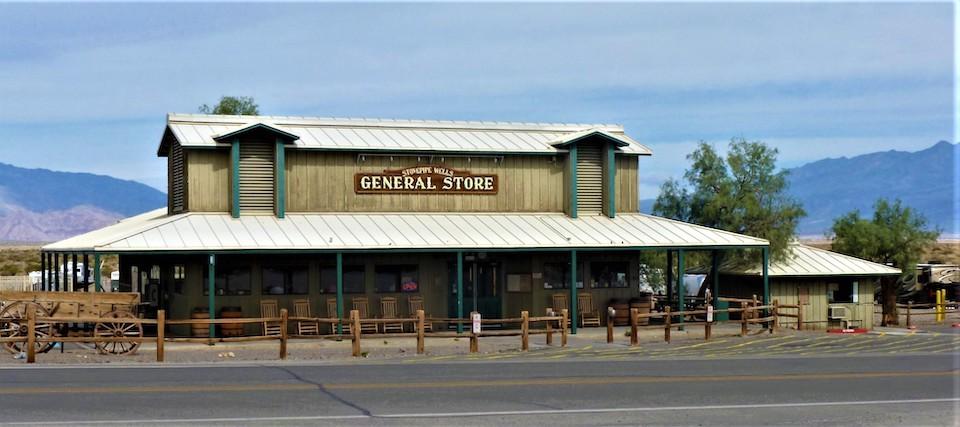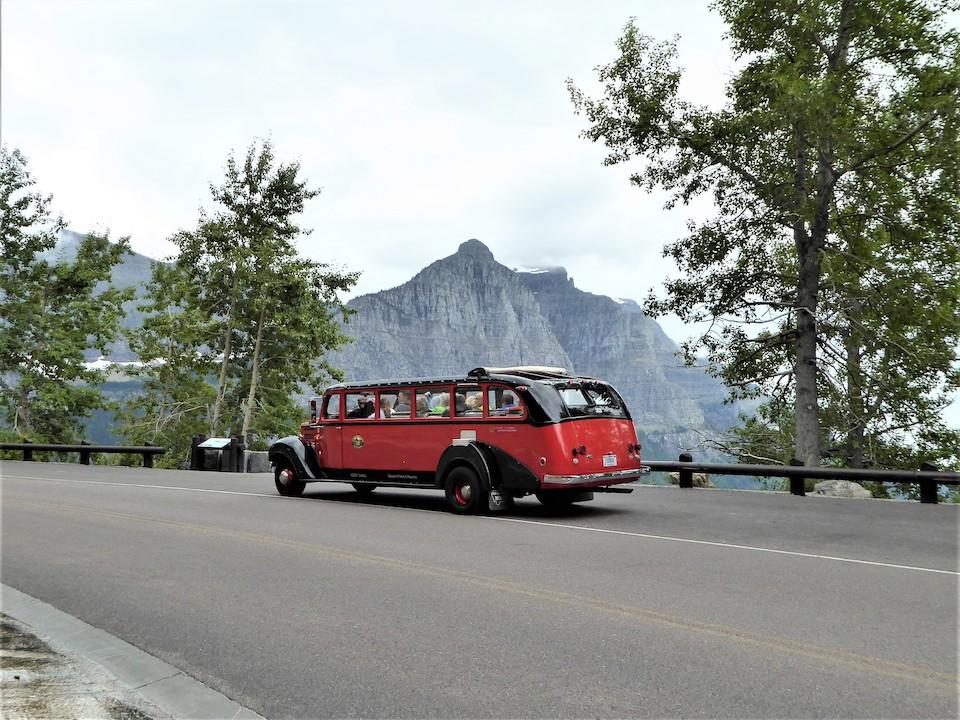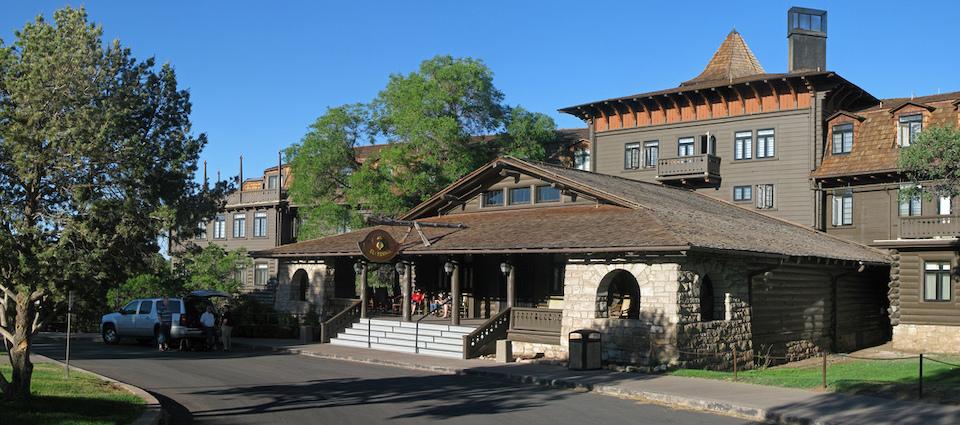
The General Store at Stovepipe Wells in Death Valley National Park is a concessionaire-run operation/David and Kay Scott
Many travelers (readers of the Traveler excepted) mistakenly believe commercial facilities in the national parks – lodging, dining, and retail - are operated by the federal government.
While national park officials have ultimate oversight on things such as pricing, these facilities are operated by private companies that bid for the right to rent rooms, operate dining facilities, sell T-shirts, and offer specified activities such as trail rides and guided tours. NPS rangers continue to staff visitor centers and offer interpretive activities, but nearly all commercial activities are handled by the private sector.
Not all facilities most of us consider being in the national parks are actually in the parks. Several lodges, including Glacier Park Lodge, Apgar Village Lodge (both at Glacier National Park), Stehekin Valley Ranch (North Cascades National Park), Dornan’s Spur Ranch Cabins (Grand Teton National Park), and three of four lodges in Death Valley are privately owned and not subject to national park oversight. Room rates and food prices at these facilities do not have to be approved by the National Park Service.
Concessionaires for decades benefited from sweetheart deals that offered little revenue to the national parks. Yosemite Park and Curry Company operated in Yosemite for nearly a hundred years before the right to handle the park’s lodging and food service was turned over to Delaware North, a company that at the time owned dog tracks and the Boston Garden, but had no experience in the national parks. The corporation has since become a major player as a national park concessionaire.
Due in part to insufficient funding by the federal government, national parks have become more aggressive in squeezing concessionaires for a greater share of concession revenues. Parks are also requiring concessionaires to spend more of their own money for improvements and new buildings. In some instances, a concessionaire that spends a large amount of money on a capital project such as new cabins gains a leasehold interest (similar to a share of ownership, although it can’t be retained if a new concessionaire is selected) in the property that is gradually depreciated during its projected life. If the investing concessionaire loses a renewal of the contract to another company, any remaining leasehold interest is recouped, either from the new concessionaire or the NPS.
Xanterra Parks & Resorts, a private company that for many years had served as the primary concessionaire in Yellowstone National Park, in 2013 won a contract to operate business facilities in the park for an additional 20 years. The length was double that of most contracts, in large part because the Yellowstone contract required a large investment on the part of concessionaire. It also offered a different road to investment recovery. Xanterra spent nearly $90 million of its own money constructing five lodge buildings in the park’s Canyon area. As compensation, NPS permitted Xanterra additional flexibility in pricing a portion of guest rooms in Canyon, Old Faithful Inn, and Lake Hotel.
Companies interested in major NPS concessions are required to win the business through a bidding process. When an existing contract is nearing expiration, the National Park Service releases a prospectus listing its minimum requirements for winning a new contract. A prospectus for lodging and/or food service might require a major renovation or construction of a new building. The prospectus is also likely to require the winning bidder to take care of needed maintenance and fork over to NPS a minimum percentage of revenues generated.

Red jammers at Glacier National Park are operated by Xanterra Parks & Resorts/David and Kay Scott
NPS will sometimes package multiple concessions in a single prospectus in an effort to entice bidders to take on a facility that is likely to be unprofitable. In 2017, the NPS issued a prospectus that packaged visitor services in Oregon Caves National Monument with those of Crater Lake National Park. Crater Lake is generally considered a desirable concession (despite its short season and small dining room) that includes a classic park lodge that is typically filled to capacity. The lodge at Oregon Caves has only 23 guest rooms and is in a relatively isolated location making it less desirable from a business standpoint for concessionaires hoping to make a profit. It seems unlikely Oregon Caves alone would have attracted any bidders. The contract was won by Aramark Parks and Destinations, which most likely took on visitor services in the monument in order to win the right to operate the concession at Crater Lake. We should mention that we have enjoyed each of our stays in the Oregon Caves chateau, a unique and interesting lodging facility.
The currently outstanding NPS prospectus for operating lodging and food service at the North Rim of the Grand Canyon requires the winning bidder to spend in excess of $6 million renovating employee dorms, revamping the main lodge registration area, and making major changes to the two motel buildings. It also requires the concessionaire to remit to NPS at least 10 percent of the revenue it generates. A bidder may feel it needs to offer NPS even more than the minimum franchise fee stipulated in the prospectus in order to win the contract. For example, it may offer a fee of 12 percent rather than 10 percent in its proposal submitted to NPS.

The high expense of operating lodges and dining rooms on the South Rim of Grand Canyon National Park, including the elegant and opulent El Tovar, led the National Park Service to break the concessions contract in two/NPS, Michael Quinn
If potential bidders feel prospectus requirements are too onerous to be able to make a profit, NPS may fail to receive any bids and thereby be forced to revise the requirements downward. For example, it may delete or delay a construction project or reduce the franchise fee. NPS unsuccessfully attempted several times to entice bidders to assume the concession operations at Bluffs Lodge and Rocky Knob Cabins on the Blue Ridge Parkway. Due to the small number of guest rooms available and expense involved in required renovations, no bidders were forthcoming and both facilities have been closed for several years.
As NPS prospectuses have become more complex, potential bidders have found it increasingly expensive to prepare and submit a proposal that is likely to require many hours of labor and may entail the expense of employing a consultant. As a result, nearly all major national park concessions are now held by a few large companies that can afford the time expense, along with employing knowledgeable people who can evaluate a prospectus and determine whether it is worthwhile to enter a bid. The emergence of a limited number of businesses controlling the concessions, along with the competitiveness of these companies, will be the subject of our next column.
David and Kay Scott are authors of “Complete Guide to the National Park Lodges” (Globe Pequot Press). Visit them at mypages.valdosta.edu/dlscott/Scott.html.



Comments
An NPS concession is required to post a notice at all points of sale to identify itself as a concession and to let customers know who and where in the National Park Service to send comments and complaints to about the concessioniare. The concession contracts with the NPS are public documents that you can get access to through FOIA requests. My experience is that the notice at point of sale is often absent and many other elements of the contracts are not being followed by consessionaires. The NPS seems to be very lax in enforcing concession contracts.
Bill, I have always been able to access NPS proposal requests but never the actual executed contract. Can you point to where those can be found?
Some facilities are less well known as NPS concessions. Golden Gate NRA has a bunch of them, including the restaurants at Cliff House. One that seemed more like a private restaurant was Louis' Restaurant, which was purchased by NPS due to its location and initially contracted out to the family that originally opened the restaurant. There was a strong sentiment to continue that arrangement without putting it up for bid, but apparently there was an issue that they had more than $500,000 in annual revenues. They ended up securing the contract, but there were some complaints that the requirements they had to meet meant they raised their prices.
The National Park Service usually posts the contract on the individual park website. For example, here is the Yosemite concessions contract: https://www.nps.gov/yose/learn/management/upload/YHcontract.pdf
Terry - That takes me to a Gopher saying " We're looking for it. In the meantime you might want to use the search tool."
ecbuck, go to https://www.nps.gov/yose/learn/management/concessions.htm
Thanks Blake. Obviously you aren't going to find this going through the standard menu structure. Is there a standard nomencalture to drill down to these for each park?
You can try contacting the individual Park information officer and perhaps they will share the contracts. I have gone to the NPS FOIA request site and gotten contracts that way. The contracts should be posted on each Park's web page and include a link in which the public can send a comment or complaint about a consessionaire. The lack of transparency in regard to NPS concession contracts is disturbing because the American People own the Parks and should have access to contracts, comment and complaint files as well as audits by the NPS of concessionaires in regard to our Parks.